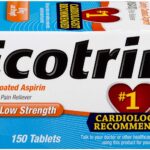Can I Use Ecotrin in Pregnancy?

Although some medicines are considered safe during pregnancy, the effects of other medicines on your unborn baby are unknown. Certain medicines can be most harmful to a developing baby when taken during the first three months of pregnancy, often before a woman even knows she is pregnant.
It can be hard to know if a medicine is safe for your baby. Most medicines are not studied in pregnant women. That’s because researchers worry about how the medicines might affect the baby. But some medicines have been taken for so long by so many women that doctors have a good idea of how safe they are.
What is Ecotrin?
Ecotrin pill is a brand of aspirin, a nonsteroidal anti-inflammatory drug (NSAID) used to relieve mild to moderate aches and pains, swelling, and fever.
Ecotrin pill is also used to prevent heart attacks in people who have had a heart attack in the past or who have angina (chest pain that occurs when the heart does not get enough oxygen). Ecotrin pill is also used to reduce the risk of death in people who are experiencing or who have recently experienced a heart attack. Ecotrin pill is also used to prevent ischemic strokes (strokes that occur when a blood clot blocks the flow of blood to the brain) or mini-strokes (strokes that occur when the flow of blood to the brain is blocked for a short time) in people who have had this type of stroke or mini-stroke in the past.
Ecotrin pills will not prevent hemorrhagic strokes (strokes caused by bleeding in the brain). Aspirin is in a group of medications called salicylates. It works by stopping the production of certain natural substances that cause fever, pain, swelling, and blood clots.
How should I take Ecotrin?
Use exactly as directed on the label, or as prescribed by your doctor. Always follow directions on the medicine label about giving Ecotrin to a child.
- Take with food if Ecotrin upsets your stomach.
- You must chew the chewable tablet before you swallow it.
- Do not crush, chew, break, or open an enteric-coated or delayed/extended-release pill. Swallow it whole.
Tell your doctor if you have a planned surgery. Do not use Ecotrin if you smell a strong vinegar odor in the medicine bottle. The medicine may no longer be effective.
Is it safe to use Ecotrin during pregnancy?
If taken during late pregnancy, Ecotrin may cause bleeding in the mother or the baby during delivery. Before using this medication, women of childbearing age should talk with their doctor(s) about the benefits and risks. Tell your doctor if you are pregnant or if you plan to become pregnant.
Ecotrin is not recommended for use in pregnancy from 20 weeks until delivery. If your doctor decides that you need to use this medication between 20 and 30 weeks of pregnancy, you should use the lowest effective dose for the shortest possible time. In some cases, low-dose aspirin (usually 81-162 milligrams a day) may be used safely during pregnancy to prevent certain conditions. Talk to your doctor for more details. Ecotrin passes into breast milk. When used in large amounts (such as to treat pain or fever), it may harm a nursing infant and breast-feeding while using this drug is not recommended. However, low-dose aspirin for heart attack or stroke prevention may be used if directed by your doctor. Consult your doctor before breast-feeding.
Low-dose aspirin has been used during pregnancy, most commonly to prevent or delay the onset of preeclampsia. The American College of Obstetricians and Gynecologists issued the Hypertension in Pregnancy Task Force Report recommending daily low-dose aspirin beginning in the late first trimester for women with a history of early-onset preeclampsia and preterm delivery at less than 34 0/7 weeks of gestation, or for women with more than one prior pregnancy complicated by preeclampsia.





